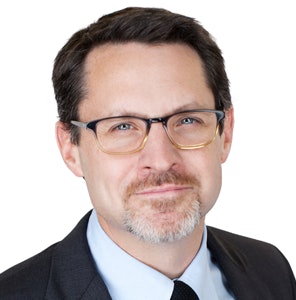A new collaboration between the Career Leadership Collective and the Association of College and University Educators (ACUE) will expand higher education faculty and career counselors’ capacity to successfully integrate career education and preparation into the essence of a student’s entire learning experience.
 Dr. Jonathan Gyurko
Dr. Jonathan GyurkoThe partnership between the two organizations comes as employers increasingly seek out graduates who are able to demonstrate the hard and soft skills cultivated from their academic endeavors. Faculty and career leaders from the Collective’s member institutions will now have the opportunity to participate in a credit-bearing course focused on career guidance and readiness competencies in addition to ACUE’s Effective Practice Framework.
“What we have found is there’s quite a bit of difference between, for example, assigning group work – which we know employers like because group work and teamwork is so prized in the workplace – and having the pedagogical skills to help students effectively manage a group, manage group dynamics, share responsibility [and] know how to professionally engage challenges when you’re in a group,” said Dr. Jonathan Gyurko, chief executive officer of ACUE. “So, our work is taking something like group work to that next level of detail so that it’s not nearly a group assignment, but a well-structured, well-facilitated experience.”
To ensure that all of the professionals on a campus can be “part and parcel” of the work of preparing students for fulfilling lives and careers, ACUE and the Collective will build on each organization’s respective strengths to offer a course consisting of online and face-to-face seminars. The course will lead to an American Council on Education-endorsed ACUE Certificate in Effective College Instruction with a concentration in Career Guidance and Readiness.
The organizations worked closely with faculty while developing their joint course to make certain that the teaching approaches and career orientation were “deeply respectful” of a professor’s discipline and research interests, Gyurko said.
Currently, more than 500 faculty and career leaders from 26 member institutions of the Collective have enrolled in the course, which is being delivered through the Council of Independent Colleges.
“The data from that implementation are very strong,” Gyurko said. “Faculty do see students making connections that they had not before, and they’re seeing the relevance of the humanities, the relevance of the sciences, the relevance of, perhaps, their general education requirements to post-graduation. We know that when students are able to make those connections, it is highly motivating.”
 Jeremy Podany
Jeremy PodanyA key aspect of preparing students to be career ready is trust, especially because faculty members spend the most time with students in their university experience, said Jeremy Podany, founder and CEO of The Collective.
“Faculty today are getting inundated with career development type questions from students,” he said. “They care. They care very much about their students’ future.”
However, faculty often express a need for more professional development to equip them with the tools to provide sophisticated answers to students’ career questions, Podany added.
ACUE and the Collective believe a combination of effective instruction and integrated career readiness will not only help faculty be innovative, but also help students refine their “success skills,” or soft skills. Some of these success skills include persuasive communication, such as how an individual influences, inspires or manages their peers. Another is having “career agility,” Podany said, which is the ability to adapt and be flexible in various contexts or roles, in various seasons of a project or career.
“Students are not thinking of a 30 year career in one discipline. They’re thinking of their passions,” Podany said, noting that faculty can insert these success skills into their domain of expertise by starting with “clarity of objective” in their syllabi, asking students reflection questions in their assignments or bringing in alumni to speak about how they carry out their role using skills learned in the classroom.
Another opportunity for faculty to integrate career readiness competencies into their pedagogy is in the ways they have students complete coursework.
“How would students write and how can we help students write a short abstract of that work and the approach and the findings?” Gyurko said. “Well, that abstract is very similar to how professors describe their own research, but it’s also something that students can use on a resume.”
Gyurko and Podany point out that the premise of the partnership is not necessarily about making faculty members into career coaches.
“That’s properly the work of a career center,” Gyurko said. “But there are things we can do within courses, within our discipline like those kinds of abstracts that have real value as a student presents and explains the work they did to a prospective employer and how it is relevant to that job they are seeking.”
The first set of credit-bearing seminars from ACUE and the Career Leadership Collective will soon become available for college and university career centers to offer to faculty for a blended learning experience.
Tiffany Pennamon can be reached at [email protected]. You can follow her on Twitter @tiffanypennamon.


















